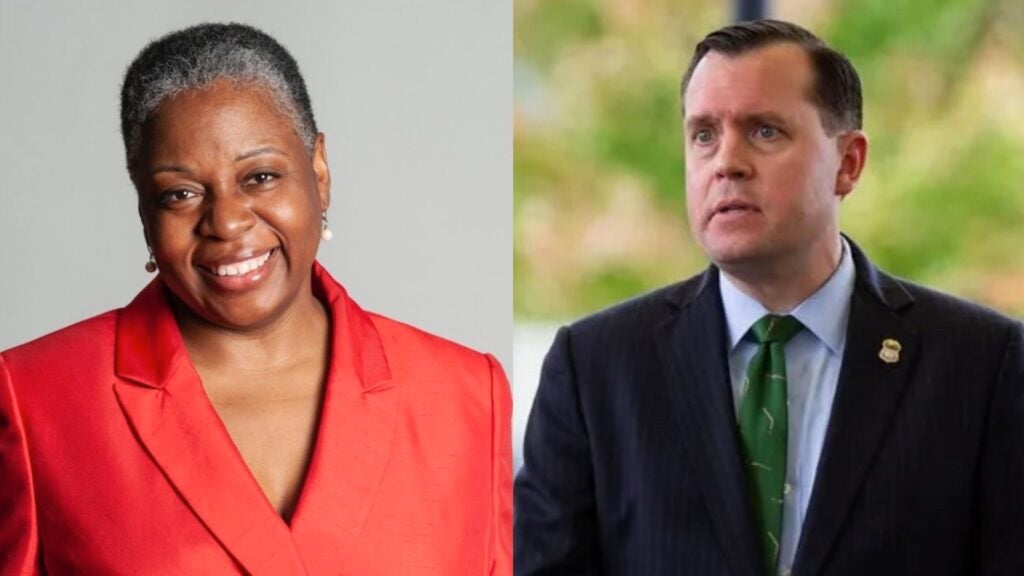Meet the candidates for attorney general
Published 11:15 am Thursday, October 19, 2023

- Democrat Pamela Stevenson and Republican Russell Coleman are running to succeed Daniel Cameron.
By McKenna Horsley
Kentucky Lantern
Voters in Kentucky’s race for attorney general will choose between a former FBI agent who served as a federal prosecutor and a retired Air Force colonel and military lawyer who won a seat in the legislature.
The winner will succeed Republican Daniel Cameron who is running for governor.
Russell Coleman, the Republican nominee who was appointed by former President Donald Trump to be the U.S. attorney for the Western District of Kentucky, said in an interview that his desire to become a “law man” began as a child.
“Being the attorney general — being the chief law enforcement officer of the commonwealth — my focus, my priority, as a dad and as a prosecutor, is protecting families at its core,” he said.”
His opponent, Rep. Pamela Stevenson, a Louisville Democrat, said she has been a public servant almost all of her life. She said as a child, she opened a ballet studio in her parents’ house because West Louisville did not have one. She has been an attorney for 40 years and has 27 years of experience in the U.S. Air Force, where she says she argued cases across the globe.
She told the Kentucky Lantern that she views the role of attorney general as one that works for Kentuckians’ best interests.
“For me, I work for the people, and I want to make sure that they can thrive because of the work we do across Kentucky,” she said.
According to the latest reports available on the Kentucky Registry of Election Finance’s website, Coleman’s campaign has raised more than $1 million, while Stevenson’s campaign has raised more than $287,000 — a difference of about $769,000.
In addition to attorney general, all of Kentucky’s statewide constitutional offices will be on the ballot on Tuesday, Nov. 7.
Here’s what Coleman and Stevenson have said about their ideas for the attorney general’s office.
Abortion
Coleman drew attention to Kentucky’s near-total abortion ban recently when he said in a TV interview that the General Assembly should add exceptions to the law for cases of rape and incest, though he said he would defend abortion laws passed by the legislature. In a statement to the Lantern, he said: “Part of being pro-life is being compassionate to crime victims.”
Coleman’s remarks echo recent remarks from Cameron, who is running against incumbent Democratic Gov. Andy Beshear.
“After listening to prosecutors, crime victims and my family, I made a statement that I believe the law should be amended to include exceptions for rape and incest in addition to the existing exception for life and health of the mother,” Coleman said at the time. “What does it mean to me to be 100% pro-life? I said it for the record for all to hear: limit abortions and protect victims of rape and incest. That’s my definition. It’s a mainstream position consistent with my faith that I believe most Kentuckians share, including so many who consider themselves pro-life.”
Stevenson, who has been endorsed by Planned Parenthood Alliance Advocates, said in a statement that she was “committed to protecting the reproductive rights and healthcare choices of Kentuckians.”
“We will refuse to prosecute patients or doctors under state law (if elected). It is essential that individuals have the freedom to make their own healthcare decisions without fear of legal repercussions,” she said last week. “I will use the office’s bully pulpit to vigorously defend the rights of patients and doctors, advocating for access to safe and legal healthcare options without interference from politicians
Law enforcement
Coleman signaled his admiration for law enforcement officers in an interview, adding he views the role of the attorney general as an intersection of law enforcement with a passion for Kentucky.
Kentucky State Fraternal Order of Police members voted to endorse Coleman, as well as all other Republican candidates. His first TV ad titled “Lawman,” released during the first week of October, calls him a “law and order conservative.”
Coleman said one of the biggest limiting factors facing the state’s law enforcement officers now is that they are “siloed” from working together. He said he has the relationships with law enforcement agencies to bring them together while his opponent does not.
“I applaud her military service, but on Day One, she’ll be starting with training wheels on. She’ll be starting from scratch as a law enforcement officer here in this Commonwealth,” Coleman said of Stevenson. “The threats are just too large to have a training or orientation period as a lawyer in the commonwealth, much less as the chief law enforcement officer of the commonwealth.”
In July, the Lexington Herald-Leader reported that Stevenson was not licensed to practice law in Kentucky, but she was in Indiana. According to the Kentucky Bar Association’s website, Stevenson’s status is listed as “Practice Pending Admission.” Under the rules of the Kentucky Supreme Court, the status means an attorney who is licensed and in good standing elsewhere and has applied for admission to the Kentucky bar, may practice law in Kentucky while their application is pending.
A spokesperson for her campaign said Tuesday that Stevenson “has fulfilled the constitutional requirements of this office and is permitted to practice law in Kentucky today.”
Stevenson said she would to build relationships with law enforcement agencies and support further raises for police officers and funding for training.
“Safe communities start with the people who are protecting our communities,” Stevenson said.
Opioid epidemic
Both candidates have made tackling Kentucky’s opioid epidemic part of their platforms. In addition to representing the commonwealth in court cases against opioid distributors, the Office of the Attorney General oversees the Opioid Abatement Advisory Commission, a group created by the General Assembly to distribute funds the commonwealth receives from opioid litigation.
According to Kentucky’s 2022 Overdose Fatality Report, 2,135 Kentuckians died from an overdose in 2022 and 90% were from opioids, with fentanyl being the predominant drug in those deaths. The report showed the commonwealth’s first decline in fatal overdoses since 2018.
Stevenson said Kentucky must deal with the opioid epidemic. The people that pour them into our state, distributors, need to go to jail and people who are addicted need to get treatment, she said.
“We wouldn’t put someone with cancer in jail,” Stevenson said.
Coleman said he was “very interested” in a proposal to invest part of Kentucky’s settlement funds in developing ibogaine as a treatment for opioid dependence and was reviewing early trial results, adding that he viewed it as “a significant investment and there’s some risk there.”
The psychedelic drug is illegal in the United States, but its advocates say it can treat severe PTSD and opioid addiction while minimizing withdrawal symptoms, although its use is associated with heart failure. The commission has considered investing $42 million of the state’s settlement funds from opioid lawsuits toward developing ibogaine as treatment.
Coleman added that a priority for opioid litigation dollars, if he is elected, would be to build out a statewide prevention effort based on best practices and data that shows what works.
Coleman called Kentucky’s $900 million from opioid settlements “a drop in the bucket given the harm that has been done here over the past decade, decade and a half, particularly in our mountain counties in Eastern Kentucky.”
Credit for the lawsuit dollars has been a point of contention in the governor’s race because Beshear was the attorney general when most of the suits were filed.
Transparency and independence
The attorney general plays a leading role in enforcing Kentucky’s open meetings and open records laws, reviewing questions from the public and officials. If someone thinks the law has been violated, they can refer the matter to the office, which then can issue an advisory opinion that has the force of law unless overruled by a court.
Stevenson said she views a free press and open records as being foundational to democracy, adding that she is a “staunch supporter” of open meetings and records laws.
Coleman said public records are “an area that I have a lot to learn” and that he would refer to some of the career staff in the office on these issues.
Stevenson, when asked what she thought of Cameron’s tenure in office, said the office “belongs to the people, for the people, by the people, to serve the people.”
“And once we reconcile our minds to that, then that means that what happens in that office will be transparent. There’s some things that should not have happened,” she said. “And for me, I work for the people, and I want to make sure that they can thrive because of the work we do across Kentucky.”
When asked what she was referring to, Stevenson said the office should be more transparent and better respond to the needs of the counties.
Coleman, who is a friend of Cameron’s, said, if both Cameron and Coleman are elected this November, he would work with his fellow Republican on several issues, such as lowering violent crime in Louisville. During the 1940s, Kentucky had a Republican governor and attorney general, when Gov. Simeon Willis and Attorney General Eldon Dummit were in office.
In recent years, attorneys general and governors have had some high-profile legal clashes. Beshear and Cameron have been at odds in various lawsuits, and before that, Beshear was attorney general and in court against former Republican Gov. Matt Bevin.
When asked if it would be difficult to differ with Cameron on anything, Coleman said the answer is simple: “I’ll enforce the law and the Constitution.”
In his interview, Coleman also praised Cameron for “using that office to push back on a radical agenda coming out of Washington, D.C,” such as working with other conservative attorneys general on national issues.
“We need our federal government focused on issues that matter, like securing the southwest border, not whether I use a gas stove,” Coleman said. Earlier this year, Cameron joined other attorneys general in opposing a proposed federal regulation on the sale of gas stoves.
Going to court
Kentucky’s attorney general can defend the state in legal matters. Cameron’s office has defended a controversial law, Senate Bill 150. At the end of September, a federal three-judge panel of the 6th Circuit U.S. Court of Appeals ruled to keep Kentucky’s ban on gender-affirming medical care for transgender minors in place.
Because he views it as the attorney general’s job to defend laws created by the General Assembly, Coleman said he will continue to follow in Cameron’s footsteps.
“The AG must take a look at the law, at this legislation on the statutes, to ensure that it complies with the Kentucky and the United States Constitution,” Coleman said. “But if it does, then there’s a duty of the attorney general to defend that law.”
Stevenson, whose floor speeches rallying against the anti-trans legislation went viral, said she believes every child is a child of God and that the government should not overreach a person’s rights.
“I will always uphold the law, and at the same time, I’m going to make sure that the law reflects the American principles of freedom and justice for all,” she said.
Todd Piccirilli, senior director of Marketing and Communications for KET, said in an email that KET will not have a program with attorney general candidates. Stevenson’s campaign said there was no formal debate set between the candidates. Coleman’s campaign did not return a request for comment about the debate.






